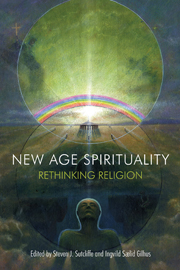Book contents
- Frontmatter
- Contents
- Introduction: “All mixed up” – thinking about religion in relation to New Age spiritualities
- Part I Rethinking New Age spiritualities
- Part II Comparing New Age beliefs and practices
- 6 Narrow New Age and broad spirituality: a comprehensive schema and a comparative analysis
- 7 Dolphins and other humans: New Age identities in comparative perspective
- 8 New Age, Sami shamanism and indigenous spirituality
- 9 The holistic milieu in context: between traditional Christianity and folk religiosity
- 10 New Age and the spirit of capitalism: energy as cognitive currency
- Part III Putting new spiritual practices to work
- Conclusion: New Age spiritualities – “good to think” in the study of religion
- Contributors
- Further reading
- Bibliography
- Index
10 - New Age and the spirit of capitalism: energy as cognitive currency
from Part II - Comparing New Age beliefs and practices
- Frontmatter
- Contents
- Introduction: “All mixed up” – thinking about religion in relation to New Age spiritualities
- Part I Rethinking New Age spiritualities
- Part II Comparing New Age beliefs and practices
- 6 Narrow New Age and broad spirituality: a comprehensive schema and a comparative analysis
- 7 Dolphins and other humans: New Age identities in comparative perspective
- 8 New Age, Sami shamanism and indigenous spirituality
- 9 The holistic milieu in context: between traditional Christianity and folk religiosity
- 10 New Age and the spirit of capitalism: energy as cognitive currency
- Part III Putting new spiritual practices to work
- Conclusion: New Age spiritualities – “good to think” in the study of religion
- Contributors
- Further reading
- Bibliography
- Index
Summary
COMMERCIALIZATION AND THE SPIRIT OF NEW AGE
In his classic work linking economy and religion, The Protestant Ethic and the Spirit of Capitalism (1920), Max Weber proposed that the Puritan teaching of predestination and its ideals of hard work, moral discipline and frugality combined with rational capital accumulation were determining elements in the successful rise of early modern capitalism. Since this book was first published, capitalism has become the dominant economic system in the world, almost mysteriously dynamic and all-pervading, and economic mind-sets and instrumental rationality are increasingly invading areas formerly outside the sphere of financial calculation. While hard work still must be considered conducive to economic success, the other values listed by Weber as “the spirit of capitalism” more or less counteract the consumer capitalism that reigns today. Peter Berger makes the obvious, but fitting comment that values which function well in one period of economic development may not be functional in another period (Berger 1999: 17). Lavish consumption is a cornerstone in Western capitalist economies, and a frugality ethic is obviously not a sustaining attitude for such a system. In a parallel way, the theological exclusivism and morality of Puritanism and its likes are unable to legitimate the multireligious commodification of today. How religious ideas and values influence economic development in a society is a pertinent question. An equally interesting issue, however, concerns how religion is shaped by economic conditions.
- Type
- Chapter
- Information
- New Age SpiritualityRethinking Religion, pp. 160 - 173Publisher: Acumen PublishingPrint publication year: 2013



